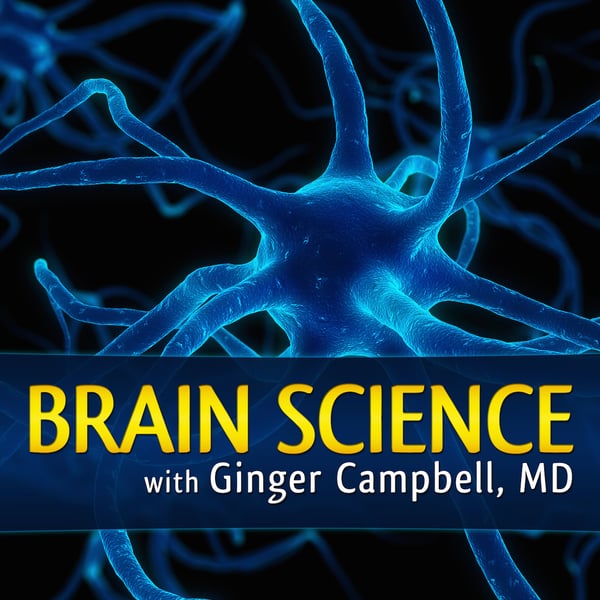BS 136 Why Reading Science Matters
Brain Science with Ginger Campbell, MD: Neuroscience for Everyone
Ginger Campbell, MD
4.8 • 896 Ratings
🗓️ 28 August 2017
⏱️ 75 minutes
🧾️ Download transcript
Summary
In Brain Science 136 we discuss "Language at the Speed of Sight: How We Read, Why So Many Can’t, and What Can Be Done About It" by Mark Seidenberg. We consider the disturbing gap between our scientific knowledge of reading and current education practices in the US.
This episode will provide the listener with some important basics about how reading changes our brains and what is known about how children learn to read. Learning to read is not as automatic as learning to talk and when problems arise, early intervention is essential.
We also consider some of the fascinating differences between written languages and how they reflect underlying differences between spoken languages. Plus---- Why speed reading is as myth!
Check out the free Brain Science Mobile app for extra content.
Send feedback to [email protected].
For more references and episode transcripts please visit http://brainsciencepodcast.com.
Transcript
Click on a timestamp to play from that location
| 0:00.0 | Welcome to brain science, the show that unravels the mysteries of how our brains make us who we are. |
| 0:11.8 | I'm your host Dr. Ginger Campbell and this is episode 136. |
| 0:16.4 | Today we are going to be talking about reading, in particular featuring a book, Language at the Speed of Sight, |
| 0:25.0 | how we read, why so many can't, and what we can do about it, |
| 0:28.7 | by Mark Seidenburg. |
| 0:30.7 | Unfortunately, I have not been able to reach Dr. Sydenberg, who is at the University of Wisconsin. |
| 0:36.2 | I haven't been able to reach him to arrange an interview, so I'm going to go ahead and do one of my old-fashioned book summaries. |
| 0:46.8 | As I said, this book is called Language at the Speed of Sight. |
| 0:51.1 | It talks about reading, writing, the relationship between oral language and |
| 0:57.6 | written language, and also it talks about the problem of the current education system at least in the United States |
| 1:07.2 | ignoring the science about how we learn how to read. |
| 1:11.6 | I want to mention that this is the second episode, well third, that I've done about reading. Back in episode 24, I talked about Mary Ann Wolf's book, Proust in the Squid, which was about reading in the brain, and I also interviewed |
| 1:26.9 | Dr. Wolf for episode 29. When I couldn't reach Dr. Sidenberger, I actually reached out to Dr. Wolf and she told me that she thinks that this book is a very excellent review of the current science of reading. |
| 1:41.0 | I'll talk more about Dr. Wolf's current work at the end of the show. |
| 1:45.8 | So what I'm going to do is I'm going to do a overview of the book and then close as I usually |
| 1:52.2 | do with a summary and some announcements. |
| 1:56.0 | So just a brief overview. |
| 1:58.0 | Dr. Steinenburg mentions that in the United States reading scores have been stagnant for decades and there's an ongoing |
| 2:06.1 | debate about how to teach reading. |
| 2:09.4 | There's also a profound disconnect between the science of reading and educational practice. |
| 2:16.6 | Dr. Seidenberg feels and I agree with him that this gap between science and education has been harmful. And of course reading science |
| 2:25.5 | can address all of the issues such as the role of poverty, but he argues that the culture of education needs to be changed from one based on beliefs to one based on facts. |
... |
Please login to see the full transcript.
Disclaimer: The podcast and artwork embedded on this page are from Ginger Campbell, MD, and are the property of its owner and not affiliated with or endorsed by Tapesearch.
Generated transcripts are the property of Ginger Campbell, MD and are distributed freely under the Fair Use doctrine. Transcripts generated by Tapesearch are not guaranteed to be accurate.
Copyright © Tapesearch 2025.

